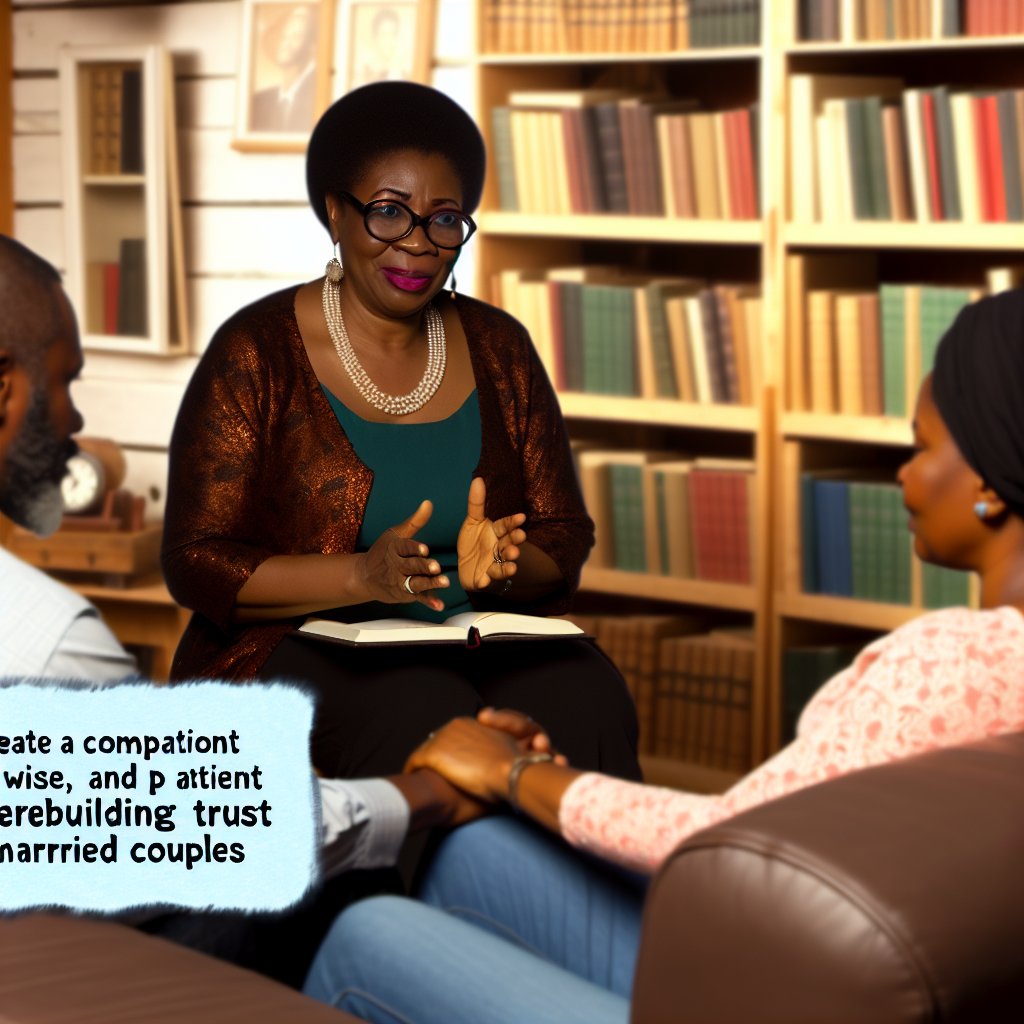Understanding the Importance of Trust in Nigerian Marriages
The Role of Trust in Relationships
Trust forms the foundation of a successful marriage.
It enables open communication between partners.
When both partners trust each other, emotional intimacy deepens.
Moreover, trust fosters a sense of security and belonging.
Consequently, couples experience reduced anxiety and stress.
Why Trust Is Particularly Important in Nigeria
Nigeria’s diverse culture influences expectations in marriage.
Trust becomes essential to navigate these cultural complexities.
In many Nigerian families, trust protects relationships from external pressures.
It also helps couples manage the intricacies of blended families.
Furthermore, trust enhances mutual respect among partners.
Consequences of Distrust
Distrust can lead to suspicion and resentment.
Partners may experience emotional distance over time.
Additionally, it can create conflicts that harm the relationship.
Ultimately, a lack of trust threatens the stability of a marriage.
Building Trust in Nigerian Marriages
Successful trust-building starts with effective communication.
Both partners should feel heard and valued in discussions.
Additionally, shared experiences strengthen the bond between spouses.
Partners must demonstrate reliability and support consistently.
Moreover, practicing transparency helps dispel doubts.
Ultimately, ongoing efforts cultivate a strong trust foundation.
Effective Communication: Key to Building Trust
Establishing Open Dialogue
Open dialogue forms the foundation of trust in any marriage.
Both partners must express their thoughts clearly.
Moreover, active listening plays a crucial role in communication.
When partners listen attentively, they validate each other’s feelings.
This practice fosters deeper emotional connections.
Practicing Empathy
Empathy enhances understanding between partners.
Each partner should strive to see issues from the other’s perspective.
Additionally, empathizing with one another nurtures compassion.
This compassion strengthens the marital bond over time.
Sharing Feelings and Concerns
Regularly sharing feelings is essential for trust-building.
It’s important to address concerns promptly and honestly.
This approach prevents misunderstandings from escalating.
By doing so, both partners feel valued and respected.
Setting Boundaries
Clear boundaries are essential in a healthy marriage.
Discussing and agreeing on personal boundaries fosters security.
Partners should feel comfortable asserting their needs.
Furthermore, mutual respect for boundaries enhances trust.
Encouraging Honesty
Honesty remains the cornerstone of any successful relationship.
Both partners should commit to transparent communication.
This commitment helps build a safe space for dialogue.
When honesty prevails, insecurities diminish over time.
Fostering Regular Check-ins
Regular check-ins help partners stay aligned.
These discussions should cover emotions, goals, and challenges.
Additionally, such practice encourages ongoing support.
When partners feel supported, trust flourishes naturally.
Demonstrating Transparency with Financial Matters
Open Communication About Finances
Open discussions about money strengthen trust in a marriage.
Couples should regularly share financial information.
This allows both partners to understand their financial situation.
Furthermore, sharing goals can create a unified vision.
Budgeting Together
Creating a budget can involve both partners actively.
This practice promotes accountability and transparency.
Setting financial priorities together builds harmony.
Moreover, it encourages joint decision-making on expenditures.
Establishing a Joint Account
A joint account can simplify shared expenses.
This account type encourages openness about spending habits.
Additionally, it fosters a sense of partnership and collaboration.
Both partners can see account transactions easily.
Regular Financial Check-Ins
Scheduling monthly financial meetings can be beneficial.
These meetings allow couples to review spending and saving.
Addressing discrepancies promptly promotes a sense of security.
Ultimately, it reinforces a team’s commitment to financial health.
Seeking Professional Guidance
Consulting a financial advisor can provide clarity.
An expert can offer unbiased assessments of finances.
Furthermore, they can help in setting realistic financial goals.
This external support encourages both partners to stay motivated.
Find Out More: Maintaining Connection: How Nigerian Couples Can Keep the Spark Alive
Setting and Respecting Boundaries in the Relationship
The Importance of Boundaries
Boundaries are essential in any relationship.
They define personal space and emotional safety.
Establishing boundaries fosters trust and respect.
Moreover, it helps partners understand each other’s needs.
Recognizing boundaries can prevent misunderstandings.
Communication is Key
Open dialogue strengthens boundary setting.
Each partner should express their feelings honestly.
Listening attentively promotes understanding and respect.
Consider discussing boundaries regularly as a couple.
This approach allows for adjustments as needed.
How to Set Boundaries
- Identify personal needs and limits.
- Discuss these elements with your partner.
- Be clear and specific about expectations.
- Use “I” statements to express feelings.
- Avoid blame or accusations during discussions.
Respecting Each Other’s Boundaries
Respect is fundamental for healthy relationships.
Both partners must honor the established boundaries.
Regularly check in with each other about comfort levels.
Adjust boundaries as the relationship evolves.
Appreciating each other’s limits fosters trust.
Challenges to Boundary Setting
Some may find it difficult to set boundaries.
Fear of conflict can hinder honest conversations.
Additionally, cultural expectations may create pressure.
Overcoming these barriers takes time and patience.
Support from friends or counselors may help.
Building Trust Through Boundaries
Respecting boundaries enhances emotional safety.
This security forms the foundation of trust.
As trust grows, partners can communicate more openly.
Thus, boundaries should evolve alongside the relationship.
Consequently, both partners feel valued and respected.
See Related Content: How to Handle Relationship Transitions in Marriage
The Role of Shared Values and Beliefs in Enhancing Trust
Understanding Shared Values
Shared values form the foundation of trust in marriages.
They foster deeper connections between partners.
Values guide decisions and behaviors within the relationship.
For instance, couples who value honesty are more likely to communicate openly.
This transparency ultimately builds mutual trust.
The Importance of Common Beliefs
Common beliefs help partners navigate challenges together.
Beliefs create a unified vision for the future.
This alignment strengthens the emotional bond between them.
When couples share beliefs about family, finance, or faith, they enhance their relationship.
These shared perspectives also reduce conflicts.
Creating a Culture of Trust
Developing shared values requires intentional effort.
Couples should engage in open discussions about their beliefs.
They can also attend workshops to align their values.
Setting mutual goals can reinforce shared beliefs.
Participating in community service as a team can deepen connection.
Maintaining Open Communication
Regular communication helps reinforce shared values.
Couples should openly express their thoughts and feelings.
This helps identify any discrepancies in values.
Furthermore, discussing personal experiences strengthens understanding.
Building Respect for Differences
Healthy relationships also appreciate differences in values.
Couples should learn to respect and understand each other’s perspectives.
This respect fosters a safe space for dialogue.
Moreover, acknowledging differences can actually enhance trust.
When partners feel validated, they become more open with each other.
Shared Values as Pillars of Trust
In summary, shared values and beliefs play a pivotal role in building trust.
A strong foundation leads to a resilient marriage.
By continuously working on their values, couples strengthen their relationship.
Ultimately, this effort leads to a lasting bond built on trust.
Delve into the Subject: How to Keep Romance Alive in Nigerian Marriages

Addressing Past Issues
Recognizing Issues Together
Start by openly discussing past issues in your marriage.
Both partners need to acknowledge their feelings and perspectives.
This recognition fosters understanding and empathy.
Moreover, it creates a safe space for communication.
Seeking Professional Help
Consider seeking guidance from a marriage counselor.
A professional can provide valuable tools for healing.
They will facilitate conversations that may be difficult.
Additionally, therapy can help identify patterns in behavior.
Establishing Emotional Safety
Ensure both partners feel emotionally safe during discussions.
This safety encourages honest sharing without fear.
Furthermore, practice active listening and validate each other’s feelings.
Creating a Healing Plan
Develop a plan for moving forward together.
Set mutual goals that promote healing and trust.
Regular check-ins can help monitor progress and resolve issues.
Building Trust Steps
Engage in activities that rebuild trust over time.
Communicate daily and show appreciation for each other.
Be consistent in your actions and promises.
Trust is built through reliability and accountability.
Practicing Forgiveness
Learn to forgive each other for past hurts.
Forgiveness does not mean forgetting, but letting go.
This process can be difficult, but it is essential for healing.
Support each other in this journey towards forgiveness.
Explore Further: The Role of Shared Goals in Strengthening Nigerian Marriages
The Impact of Fidelity and Loyalty on Marital Trust
Understanding Fidelity in Marriage
Fidelity forms the backbone of trust in marriage.
When partners remain faithful, they create a secure environment.
This security fosters emotional intimacy between couples.
Moreover, fidelity eliminates doubts that can erode trust.
The Role of Loyalty
Loyalty strengthens the bond between spouses.
It demonstrates commitment to one another.
When one partner feels valued, trust deepens significantly.
Loyal partners actively support each other’s dreams.
The Consequences of Betrayal
Betrayal often leads to feelings of insecurity.
It can create a rift that becomes difficult to mend.
Trust, once broken, takes time to rebuild.
Open communication can help process feelings of betrayal.
Building Trust Through Communication
Effective communication nurtures openness in a relationship.
Couples should discuss their feelings regularly.
This practice covers not just concerns but also positive experiences.
Active listening demonstrates loyalty and value for each other’s opinions.
Practicing Transparency
Transparency is essential in cultivating marital trust.
Partners must share their thoughts without fear of judgment.
This honesty promotes a deeper level of intimacy.
It also assures each partner of their commitment to fidelity.
Reinforcing Trust through Actions
Actions speak louder than words in a marriage.
Regular acts of love and kindness can reaffirm loyalty.
These gestures show partners they are appreciated.
Couples should make an effort to create memorable experiences together.
The Importance of Forgiveness
Forgiveness plays a vital role in healing marital wounds.
It allows couples to move past mistakes and rebuild trust.
Holding onto grudges can harm the relationship indefinitely.
Practicing forgiveness fosters growth and mutual understanding.
Creating a Supportive Environment for Vulnerability and Openness
Understanding Vulnerability
Vulnerability is essential for a strong marriage.
It allows partners to connect deeply.
Being vulnerable fosters trust between spouses.
Thus, individuals should embrace their true selves.
Encouraging Open Communication
Open communication builds a supportive atmosphere.
Couples must regularly share their thoughts and feelings.
Active listening enhances understanding and respect.
Moreover, acknowledging each other’s emotions is vital.
Practicing Active Listening
Active listening involves focusing on the speaker.
Avoid distractions to show genuine interest.
Responding with empathy strengthens emotional bonds.
Consequently, both partners feel valued and understood.
Creating Safe Spaces
Safe spaces encourage honest conversations.
Couples should designate times for discussions.
During these times, negativity should be set aside.
A positive environment promotes openness and trust.
Establishing Non-Judgmental Attitudes
Non-judgmental attitudes enhance vulnerability.
Couples must withhold criticism during conversations.
Instead, they should focus on understanding each other’s feelings.
Additionally, showing compassion helps partners feel secure.
Sharing Personal Stories
Sharing personal stories can deepen connections.
It allows couples to learn about each other’s pasts.
Such sharing fosters intimacy and trust.
Furthermore, it promotes empathy and understanding.
Practicing Transparency
Transparency lays the groundwork for trust.
Both partners should be honest about their feelings.
They must communicate their needs and expectations openly.
Ultimately, transparency nurtures a healthy relationship.
Fostering Emotional Support
Emotional support is crucial in marriages.
Couples should stand by each other during challenges.
Showing empathy strengthens their bond.
Also, celebrating each other’s successes reinforces trust.
Engaging in Regular Check-Ins
Regular check-ins keep communication open.
These sessions allow partners to discuss their feelings.
Moreover, they can address any concerns proactively.
This practice helps maintain a healthy dynamic.




